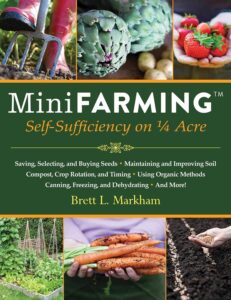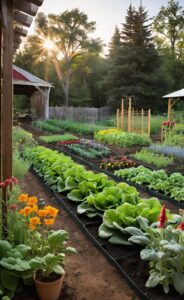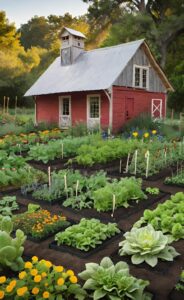In an era where much of our food is mass-produced and processed, injected with chemicals and GMO’s, the art of homesteading and gardening may seem antiquated. However, more and more people are rediscovering the joy and benefits of producing their own food. Not only is it a fantastic hobby, but it’s also a significant step toward sustainability, self-sufficiency, and good health.
The Pleasure of Growing Your Own Food
There’s a unique and profound joy in participating directly in the process of food production. This begins with the simple act of sowing a seed, which we then nurture and protect. We watch with pride as our plants mature, bloom, and eventually bear fruit.
This connection to the natural realm, the ability to work in harmony with it, gives us a deep appreciation for the rhythms of life and nature. The food that comes from your garden is often superior to that bought from a store, not just in freshness but in nutrients and flavor as well. This is a direct reflection of your efforts and commitment, making every meal an occasion for celebration and gratification.
A Significant Step Toward Sustainability
By cultivating your own garden and pursuing a homesteading lifestyle, you’re playing an active role in protecting the environment. Growing food at home eliminates the carbon emissions associated with transporting produce from farms to grocery stores, helping to reduce your carbon footprint. Additionally, it gives you the power to control the amount of waste you generate. One significant advantage is the ability to compost.
This process involves taking organic waste like fruit peels, vegetable scraps, and yard trimmings and converting them into a rich soil amendment or even food for your chickens. Not only does this reduce the amount of trash heading to the landfill, but it also creates a nutrient-dense, organic medium for your garden to flourish in. This focus on sustainable practices enables you to live more harmoniously with the earth, ensuring that resources are preserved for future generations. By choosing to homestead and garden, you’re effectively becoming a steward of the plane, and this can be a rewarding and fulfilling endeavor.
Homesteading as a Money-Saving Venture
Embarking on a homesteading journey can be beneficial to your wallet. Growing your own fruits, vegetables, and herbs directly translates into savings on your grocery shopping. The initial investment in seeds, seedlings, or young plants is usually much smaller than the cost of buying the same quantity of fresh produce. And the fact that a single plant can provide multiple harvests over a season or even several years enhances the return on your investment.
There’s also the aspect of food preservation, a common practice among homesteaders. With techniques like canning, freezing, and dehydrating, you can extend the life of your harvest well beyond its growing season, allowing you to enjoy the fruits (and vegetables) of your labor throughout the year. This not only adds variety to your meals but also further reduces your grocery expenses.
Aside from the garden, small livestock can be another source of savings. Chickens, for instance, can provide a steady supply of eggs, while goats can offer milk. Both these items are staple ingredients in many households, and having your own source can mean substantial savings over time. Plus, like with gardening, raising your own livestock means you know exactly what goes into their care and feeding, giving you control over the quality of your food.
In essence, homesteading can serve as a tool for financial resilience. While it requires effort and commitment, the savings you reap, coupled with the knowledge and satisfaction of self-reliance, can make it a worthwhile endeavor.
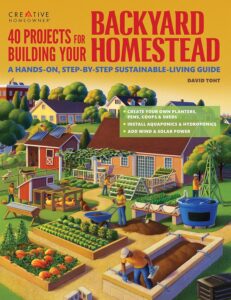
> Check Current Book Prices <
Mental and Physical Health Benefits
Engaging in homesteading and gardening is not only beneficial to your plates, but also to your overall health and wellness. Regular garden tasks like digging, planting, weeding, and harvesting are forms of moderate-intensity exercise. They help burn calories, build muscle, and improve heart health. These physical activities under the sun can also boost your vitamin D levels, which is essential for healthy bones and immune system.
Additionally, these activities are a form of therapeutic healing. Multiple research studies indicate that gardening can play a significant role in reducing stress levels and promoting mental relaxation. It encourages mindfulness as you focus on the present task, whether it’s nurturing seedlings or observing the progress of your plants. This act of connection with nature can elevate mood, decrease anxiety, and foster a sense of peace and tranquility.
The satisfaction of seeing your seeds sprout and grow into mature plants, blooming with fresh produce that you’ve nurtured, can also enhance feelings of self-worth and accomplishment. This sense of achievement can positively impact your mental wellbeing, making homesteading and gardening a holistic health activity.
In essence, gardening is a tool that cultivates not just plants, but also a healthier and happier you. By integrating homesteading and gardening into your lifestyle, you’re not only producing fresh, nutritious food but also investing in your mental and physical health.
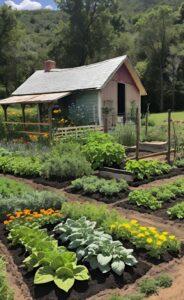
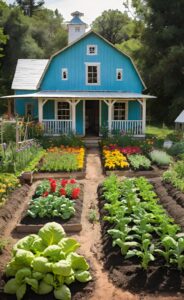
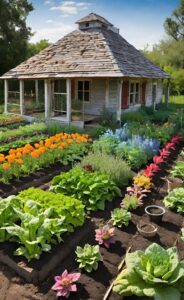
Teaching Life Skills and Values to the Next Generation
Engaging children in the practices of homesteading and gardening can be a hands-on, experiential way to teach them valuable life skills and principles. Activities such as planting seeds, watering the garden, and caring for livestock instill in children a sense of responsibility and an understanding of the importance of daily care and attention to tasks. Watching a seed transform into a blossoming plant after weeks of nurturing can be an empowering experience for children, teaching them about patience, perseverance, and the fruits of labor.
Integrating children into the homesteading routine also provides an opportunity to impart the value of sustainable living. As they learn how to compost kitchen scraps or collect rainwater for the garden, children gain a greater appreciation for resource conservation. They can understand the importance of reducing waste and recycling, learning how every small action contributes to the health of our plane.
The practice of gardening and animal rearing can also spark conversations about nutrition and health. As they participate in the process of growing their own food, children can better understand where their meals come from and the importance of wholesome, natural ingredients.
Additionally, homesteading encourages a spirit of self-reliance, creativity, and independence, demonstrating to children that they have the ability to produce and provide for their own needs. These are invaluable skills that can serve them well in the future. Through all these lessons, the practices of homesteading and gardening can play a significant role in shaping children’s values and understanding of the realm, setting a strong foundation for a lifetime of real environmental consciousness and respect for nature, not this new age woke retardation and carbon taxes.
Creating Community and Sharing the Bounty
Engaging in homesteading and gardening not only serves personal benefits but also plays a vital role in fostering community relationships. The act of sharing your freshly harvested fruits, vegetables, and herbs with friends, neighbors, and even local food banks is a tangible expression of kindness that can bring people together. It promotes an atmosphere of giving, creating stronger bonds within your community. It’s a delightful way to share not just your produce but also the fruits of your labor, your experiences, and your passion for sustainable living.
Furthermore, community gardens or shared homesteading projects can serve as a catalyst for social interaction and cooperation. These initiatives invite individuals from various walks of life to contribute and collaborate towards a shared vision of sustainability. Working side-by-side in a garden, people can exchange knowledge, learn from each other, and strengthen communal bonds. These settings can also serve as a platform for mentoring and intergenerational learning, where the experienced gardeners can share their wisdom with the beginners.
Overall, the act of gardening and homesteading extends far beyond the borders of your own backyard. It plays a critical role in building social cohesion, fostering a sense of belonging, and strengthening communal ties. Through sharing your bounty and collective gardening ventures, you contribute to creating a resilient and connected community.
